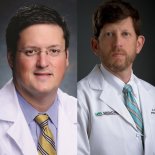

There’s no way to anticipate the unique questions, concerns, and types of support you’ll need during pregnancy, and that’s why perinatal nurse navigators are an important part of UAB's pregnancy care team. Nurse navigators Jasmine Maye, RN, and TeShawn Hardy, RN, join Dr. Huh to explain how they engage with patients and the rest of the team. They highlight some key moments when having a perinatal nurse navigator makes a big difference.

Placenta accreta spectrum, a condition where the placenta doesn’t detach after delivery, can quickly become life-threatening. Dr. Huh talks with gynecologic oncologists Michael Straughn, M.D., and Trey Leath, M.D., about what makes this a dangerous condition; how it may affect the bladder; and why it’s most often managed with a hysterectomy. Learn why early diagnosis and referral to a tertiary center can make all the difference.

Placenta accreta spectrum, which refers to a placenta that attaches too deeply, is a little-known condition with serious risks for pregnant women. Dr. Huh speaks with Akila Subramaniam, M.D., and Haller Smith, M.D., about the condition’s rising incidence, how it is diagnosed, and how team-based planning improves outcomes. Learn how early recognition helps providers prepare for safer deliveries.

Black women in Alabama are three times more likely to die from pregnancy-related causes than white women.
Audra Williams, M.D., and prenatal nurse navigator Jasmine Maye discuss the clinical and socioeconomic hurdles to improving Black maternal health, as well as the programs making a positive difference.

Occasional exhaustion is normal during and after pregnancy, but it's important to watch for signs of emerging mental health conditions. In Part 2 of their discussion on perinatal mental health, Dr. Huh, Rachel Fargason, M.D., and Katie Orr, M.D., explain key warning signs, available treatments, and how loved ones can provide meaningful support. They emphasize that the best approach is often a combination of medical and non-medical therapies.
Resources:
UAB Community Psychiatry Program: 205-934-4108
UAB Comprehensive Addiction in Pregnancy Program (CAPP): 205-934-5795
UAB Beacon Recovery Program: beacon@uabmc.edu; 205-917-3733
Postpartum Support International: www.postpartum.net; Helpline: 1-800-944-4773
National Maternal Mental Health Hotline: 1-833-852-6262

Up to 85% of women experience postpartum mood disorders. Rachel Fargason, M.D., and Katy Ashley Orr, CRNP, join Dr. Huh to discuss perinatal mental health and explain the differences between temporary “baby blues” and more serious mental health conditions. Learn how to recognize the signs of postpartum depression and anxiety, key risk factors, and when to seek support.
Stay tuned for part 2, when the panel will discuss perinatal mental health treatment options and resources.
UAB Community Psychiatry Program: 205-934-4108
UAB Comprehensive Addiction in Pregnancy Program (CAPP): 205-934-5795
UAB Beacon Recovery Program: beacon@uabmc.edu; 205-917-3733
Postpartum Support International: www.postpartum.net; Helpline: 1-800-944-4773
National Maternal Mental Health Hotline: 1-833-852-6262

Hormone replacement therapy (HRT) is generally a safe and effective way to relieve numerous symptoms and risks related to life after menopause. Gretchen Wells, M.D., a cardiologist with expertise in women’s heart health, joins Dr. Huh to give context to a study that created some reluctance among doctors and patients to utilize HRT. Learn what the Women’s Health Initiative study actually concluded about HRT; how women can generally lower their risk of cardiovascular disease; and which individual factors determine if HRT is right for you.

Almost every drug and treatment advancement available to you had to be proved safe and effective by way of clinical trials — studies on human participants. Learn the fundamentals of clinical trials from Rebecca Arend, M.D., medical director of the Clinical Trials Office at the O’Neil Comprehensive Cancer Center. She discusses the the stages of clinical trials, important research concepts, and the safeguards for participants. Dr. Arend explains why she believes many patients should seek out clinical trials for their condition.

Do you know the difference between bacterial vaginosis (BV) and a yeast infection? What about trichomoniasis, which has similar symptoms of vaginal inflammation and discomfort? These are the most common causes of vaginitis, and they each have different treatment regimens. Learn more about the common conditions from the physicians who lead the UAB Vaginitis Clinic, Christina Munzy, M.D., and Olivia Van Gerwen, M.D. They discuss the widespread prevalence of vaginitis; different causes and treatments; and how their clinic manages recurrent and severe cases with the latest diagnostic tools.

Menopause is a natural physiological process that can diminish quality of life for some women, usually occurring after age 40. Hormone replacement therapy (HRT) can address many of the symptoms of menopause. However, a series of large studies in the early 2000s pointed to increased risks for breast cancer and heart disease, and many providers and women shied away from HRT. William Hurd, M.D., an expert in reproductive endocrinology and infertility, explains the current – revised – state of knowledge about relative risks and benefits of HRT; how the HRT medications themselves have changed since those studies; and how the needle is moving back in favor of HRT for many women seeking to maintain quality of life.

Clinicians have the ability to eliminate cervical cancer thanks to improved screening and the HPV vaccine. At the same time, mortality rates in our mostly-rural state are roughly the same as they were in 1999. Isabel Scarinci, vice chair of global and rural health, introduces Operation Wipeout, a UAB-led plan that mobilizes civil society groups to encourage screening and vaccination across Alabama. Dr. Huh and Scarinci also discuss the hope that self-sampling for HPV screening could offer for women in rural areas who may not be able to travel to a clinic.

Girls and young women (0-18) may have unique gynecological issues, yet there are few pediatric and adolescent gynecologists. Blair Lacy, M.D., one of just four such subspecialists in Alabama, explains her training and the complex considerations of working with young women. She also conveys the importance of her clinic being a safe place for parents to seek specialty care and advice about sensitive issues facing their children.

The pelvic floor is an important muscle structure at the base of the pelvis, and when it is not functioning properly it can cause issues such as painful intercourse, incontinence, and prolapse. Jennifer Fagen, a physical therapist who specializes in pelvic floor physical therapy, discusses how she helps patients address pelvic floor dysfunction through internal exams, education and feedback, and specific tailored exercises. Most of her patients improve their pelvic floor function over time, whether their muscles had been chronically tense or lax.

As many as 85% of gynecologic cancer survivors face sexual health challenges. Learn from Christina Wilson, CNP, Ph.D., about the dimensions of sexual health and how UAB providers approach each case uniquely with an expanding array of treatment options for survivors. She emphasizes that this common and sensitive aspect of survivorship is important to address with your doctor. Wilson encourages patients to think about whether or when to include their partner in planning for the sexual health effects of cancer.

Obstetrical injuries, or those that occur during labor and delivery are more common than patients may realize. Six to seven percent of women undergoing vaginal deliveries will have damage to the anal sphincter muscles, or obstetric anal sphincter injuries (OASIS). Holly Richter, M.D., and Clark Powell, M.D. discuss the complex care required for these injuries and describe their research-backed OASIS care bundle that offers a comprehensive approach bridging obstetrics and gynecology. Learn more about the importance of talking about and addressing OASIS, preferably at an institution that actively assesses quality of care.

More women are choosing to delay childbirth until their late 30s and early 40s. Diedre Gunn, M.D., joins Dr. Huh to discuss the relationship between age and infertility. She describes both the challenges and opportunities for women seeking to conceive beyond the optimal age range. Learn about the circumstances under which you and your OBGYN might consider options such as IVF, use of donor eggs, or freezing eggs and embryos.

First trimester pregnancy losses, more commonly referred to as miscarriages, occur in around 10% of all pregnancies. Dr. Huh is joined by Shweta Patel, M.D., an obstetrician, to share little-known facts about early pregnancy loss that can help patients understand this emotional experience: Why does it happen? What are the risk factors you can and can’t control? How can a pregnancy loss be managed according to your wishes? The doctors also discuss how they help patients through feelings of grief and loss amid further family planning.

Women’s health providers often deliver unexpected or difficult news to patients who may face an emotional rollercoaster. Dr. Huh discusses this important interpersonal aspect of care with Brian Brocato, M.D., a lead physician of the UAB Comprehensive Addiction in Pregnancy Program (CAPP). The doctors discuss the art of listening and connecting patients with counseling when appropriate; encouraging open communication; helping patients look toward their future realistically; and including other loved ones and family in conversations about grief or family planning after a difficulty. Learn more about the special connection effective women’s health providers share with their patients through ups and downs.

Modern obstetrics depends on information gathered by way of ultrasound imaging (also called sonography). Most women will have 2-3 ultrasounds at specific points in their pregnancies as part of normal care. Sheri Jenkins, MD, and Niki Marsh, a sonographer, join Dr. Huh to discuss the ultrasound process and how the scans are used to provide individualized care throughout a pregnancy. Learn more about the rigorous national ultrasound accreditation held by UAB Maternal-Fetal Medicine.
 Certified nurse-midwives (CNM) are advanced practice nurses who offer women continuity of care throughout adulthood, including during labor and delivery. Shelia Lopez and Anna Floyd, CNMs, join Dr. Huh to discuss the relaunch of the nurse-midwifery pathway at the UAB School of Nursing, and what it could mean for women’s health in our state. Learn more about the broad scope of care CNMs offer and how they work with other OB/GYN providers as the “gatekeepers of normal physiologic birth.”
Certified nurse-midwives (CNM) are advanced practice nurses who offer women continuity of care throughout adulthood, including during labor and delivery. Shelia Lopez and Anna Floyd, CNMs, join Dr. Huh to discuss the relaunch of the nurse-midwifery pathway at the UAB School of Nursing, and what it could mean for women’s health in our state. Learn more about the broad scope of care CNMs offer and how they work with other OB/GYN providers as the “gatekeepers of normal physiologic birth.”